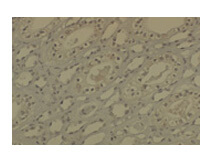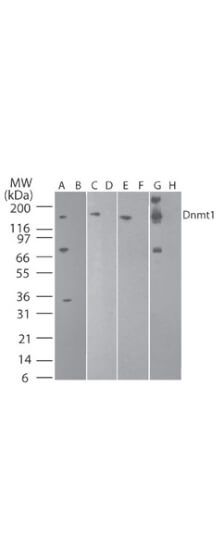Datasheet is currently unavailable. Try again or CONTACT US
DNMT1 Antibody
Mouse Monoclonal 60B1220.1 IgG1 kappa
200-301-H69
100 µg
Liquid
WB, IHC, IF, FC, ChIP, IP
Human, Mouse
Mouse
Shipping info:
$50.00 to US & $70.00 to Canada for most products. Final costs are calculated at checkout.
Product Details
Anti-DNMT1 (MOUSE) Monoclonal Antibody - 200-301-H69
AIM, CXXC9, DNMT, DNA (cytosine-5)-methyltransferase 1, CXXC-type zinc finger protein 9, DNA methyltransferase HsaI
Mouse
Monoclonal
IgG1
Target Details
DNMT1 - View All DNMT1 Products
Human, Mouse
Conjugated Peptide
Dnmt1 Antibody was produced in mice prepared by repeated immunizations with a synthetic peptide corresponding to internal amino acids with Dnmt1 human protein.
Anti-Dnmt1 Antibody was purified by Protein G chromatography. A BLAST analysis was used to suggest cross-reactivity with Dnmt1 from human, mouse and Zebrafish based on 100% homology with the immunizing sequence. Cross-reactivity with Anti-Dnmt1 from other sources has not been determined.
Application Details
ChIP, FC, IF, IHC, IP, WB
Anti-DNMT1 antibody is tested for use in WB, ChIP, Flow, Flow-IC, ICC/IF, IHC-Fr, IHC-P, and IP. Expect a band approximately 183 kDa on specific lysates. Specific conditions for reactivity should be optimized by the end user.
Formulation
1.0mg/mL by UV absorbance at 280 nm
0.02 M Potassium Phosphate, 0.15 M Sodium Chloride, pH 7.2
0.05% (w/v) Sodium Azide
0.05% BSA
Shipping & Handling
Dry Ice
Store vial at -20° C prior to opening. Aliquot contents and freeze at -20° C or below for extended storage. Avoid cycles of freezing and thawing. Centrifuge product if not completely clear after standing at room temperature. This product is stable for several weeks at 4° C as an undiluted liquid. Dilute only prior to immediate use.
Expiration date is one (1) year from date of receipt.
Anti-Dnmt1 antibody detects human Dnmt1. Methylation of DNA at cytosine residues plays an important role in regulation of gene expression, genomic imprinting and is essential for mammalian development. Hypermethylation of CpG islands in tumor suppressor genes or hypomethylation of bulk genomic DNA may be linked with development of cancer. To date, 3 families of mammalian DNA methyltransferase genes have been identified which include Dnmt1, Dnmt2 and Dnmt3. Dnmt1 is constitutively expressed in proliferating cells and inactivation of this gene causes global demethylation of genomic DNA and embryonic lethality. Dnmt2 is expressed at low levels in adult tissues and its inactivation does not affect DNA methylation or maintenance of methylation. The Dnmt3 family members, Dnmt3a and Dnmt3b, are strongly expressed in ES cells but their expression is down regulated in differentiating ES cells and is low in adult somatic tissue. Dnmt1 co-purifies with the retinoblastoma (Rb) tumor suppressor gene product, E2F1, and HDAC1. Dnmt1 also cooperates with Rb to repress transcription from promoters containing E2F-binding sites suggesting a link between DNA methylation, histone deacetylase and sequence-specific DNA binding activity, as well as a growth-regulatory pathway that is disrupted in nearly all cancer cells. Anti-Dnmt1 antibody is ideal for investigators involved in cancer, cell cycle protein research and epigenetics.
This product is for research use only and is not intended for therapeutic or diagnostic applications. Please contact a technical service representative for more information. All products of animal origin manufactured by Rockland Immunochemicals are derived from starting materials of North American origin. Collection was performed in United States Department of Agriculture (USDA) inspected facilities and all materials have been inspected and certified to be free of disease and suitable for exportation. All properties listed are typical characteristics and are not specifications. All suggestions and data are offered in good faith but without guarantee as conditions and methods of use of our products are beyond our control. All claims must be made within 30 days following the date of delivery. The prospective user must determine the suitability of our materials before adopting them on a commercial scale. Suggested uses of our products are not recommendations to use our products in violation of any patent or as a license under any patent of Rockland Immunochemicals, Inc. If you require a commercial license to use this material and do not have one, then return this material, unopened to: Rockland Inc., P.O. BOX 5199, Limerick, Pennsylvania, USA.


